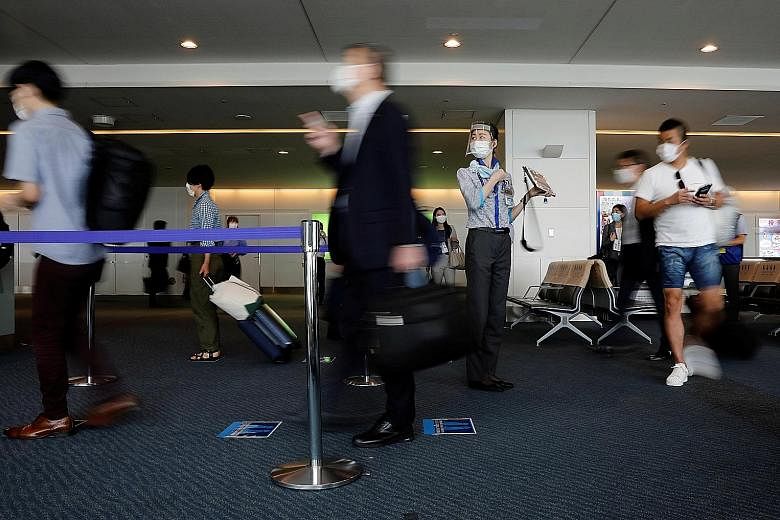Japan yesterday lifted its coronavirus domestic travel advisories that had urged people not to move across prefecture borders, in the hope that domestic tourism will fire up a moribund economy.
Tokyo, the bustling capital of 14 million people, also lifted its temporary closure requests for live music venues, nightclubs and other entertainment spaces.
"We shall raise the level of social and economic activities further," Prime Minister Shinzo Abe said on Thursday, as he announced plans to open the country's borders to business tourists.
Japan will initially accept up to 250 people daily, from countries with low infection risks such as Vietnam and Thailand.
Chief Cabinet Secretary Yoshihide Suga said yesterday: "The risk of infection cannot be reduced to zero, but we can strive for a new lifestyle that allows us to raise the level of socio-economic activities while controlling the risk of infection."
But the easing of restrictions has raised concerns, especially since Tokyo recorded another 35 Covid-19 infections yesterday, bringing its total to 5,709.
There were 238 cases altogether in the past week, many of them traced to clusters in clubs at nightlife entertainment districts that had defied official requests to shut temporarily.
Already, one case can be traced to Tokyo. Fukushima in the north-east yesterday recorded its first case in 41 days - a Fukushima University student, who is suspected to have been infected by a friend who visited from Tokyo, despite government requests not to travel beyond prefecture borders.
A modelling study by University of Tsukuba professor Setsuya Kurahashi showed that the number of severe coronavirus cases among those in Japan's tourism spots could be three times higher when all travel advisories are lifted.
He called for stronger infection prevention measures, including boosting polymerase chain reaction tests, to better protect tourism industry workers and find and snuff out clusters quickly.
Japan has been grappling with the question of when, and how, to ease its Covid-19 measures, even after a nationwide state of emergency was ended late last month.
With yesterday's moves, Japan will allow up to 1,000 people at events, or up to half the total capacity in the case of an indoor venue, whichever is lower. This is up from the previous cap of 100 for indoor venues and 200 for outdoor events.
The latest curbs are slated to be lifted entirely in three weeks' time.
Many tourist attractions, including the historic Dogo Onsen in Ehime prefecture and the scenic Tateyama Kurobe Alpine Route in Toyama prefecture, were reopened to visitors yesterday.
But some, like the Tokyo Disney Resort, remained shut.
Dr Kazuhiro Tateda, president of the Japanese Association for Infectious Diseases, told a news briefing in response to a question by The Straits Times: "It is very difficult to judge the right timing to lift restraints but, at the moment, the cluster response team that Japan has in place has enough capacity to respond to new infections."
He added: "Close monitoring will continue and... if we see a surge in infections, we can impose more stringent controls."
Tokyo Governor Yuriko Koike had said earlier this week the recent rise in infections in the capital suggested improved contact tracing as well as closer cooperation from the nightlife industry.
She also stressed that the higher numbers do not indicate worsening community transmission.
Japan also launched a smartphone contact-tracing app yesterday to notify people who have come into close contact with infected cases.
To assuage privacy concerns, the government said the app will delete contact data after 14 days and not store phone numbers or location data.

